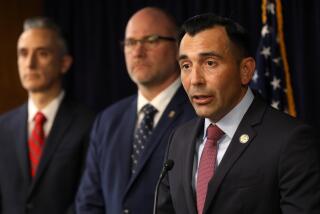Unorthodox Japanese Banker Cashes In on International Flair : Profile: A former top official in the Ministry of Finance and now chairman of the Bank of Tokyo, Toyoo Gyohten is a man of ideas with a global perspective.
- Share via
TOKYO — He once posed for the cover of a U.S. business magazine wearing a kimono and holding a Japanese cup of tea, but the most striking thing about Toyoo Gyohten is how un-Japanese he can seem.
The chairman of the Bank of Tokyo, one of Japan’s most venerated financial institutions, never seems so comfortable as when he is standing in front of a room full of Westerners, speaking impeccable English.
In monthly gatherings at the bank’s guest house in a tony Tokyo neighborhood, the former high official of the powerful Ministry of Finance expounds on everything from Japan’s push into Asia to its industrial and foreign policies.
“I consider myself a man doing not only a private banker’s job but at the same time doing some advisory work for the country,” he said.
In a time-honored practice for Japan’s top bureaucrats, Gyohten landed a plum job in a prestigious private institution after working for years in government.
But unlike many peers in Japan’s staid banking world, he freely speaks his mind--and complains that his countrymen do not do so often enough in international forums.
He recently even performed the most un-Japanese act of violating decorum and grilling one of his guest house speakers, a foreign-aid official who was skirting a reporter’s question.
The Bank of Tokyo, the country’s ninth-largest commercial or “city” bank, has assets worth 23 trillion yen, or about $231 billion, including Union Bank of California. Since Gyohten became chairman 2 1/2 years ago, Japan’s most internationally oriented bank has successfully written off a plethora of bad loans to developing countries.
In December, it reported half-year operating profit, or profit in its core banking businesses, of 92.8 billion yen, 3.6% higher than in the same period a year earlier--and much better than the competition.
But Gyohten, who often travels to Europe or North America, where he is on the boards of at least 10 think tanks and advisory groups, does not seem deeply involved in the day-to-day workings of his bank.
“The chief executive is the president, and he minds the house at home, you see. But the man who represents the bank outside is primarily the chairman,” said Gyohten’s predecessor, Yusuke Kashiwagi.
When Gyohten, now 63, was growing up in wartime Japan, his mind was far from finance, but he did have an eye on the rest of the world. The son of a warehouse company executive in the port city of Yokohama, he became enthralled with the writings of one of America’s most famous Communists.
Gyohten wanted to emulate John Reed, who wrote from Moscow at the start of the Russian Revolution, and be a journalist stationed at history’s crossroads.
But Japan was in a recession during Gyohten’s senior year at Tokyo University, in 1954, and newspapers were not hiring, so he took the civil service exam.
After passing the exam, Gyohten joined the Finance Ministry and immediately applied to go overseas, first landing a Fulbright fellowship to study economics at Princeton University. He then spent two years as a trainee at the International Monetary Fund in Washington.
He returned to Japan in 1962 and rose quickly through the ministry’s ranks. In 1985, when he was vice minister for international affairs, Institutional Investor magazine put him on its cover, citing him as a particularly international-minded bureaucrat.
Gyohten’s international impact was perhaps most felt when he was in the “currency mafia,” a group of high officials of the top five industrialized nations who met secretly in the mid-1980s to revise world currency values.
His dream, he said, is to achieve a consensus among major currency nations that stability of the exchange rate is supremely important.
Rather than noting the currency mafia’s role in setting off the rise of the yen--which has helped choke Japan’s economy by making exports expensive--he criticizes currency speculators for making “the exchange market behave without adequate rationale.”
After retiring from the Finance Ministry in 1989, Gyohten returned to Princeton as a visiting professor, then spent a year teaching at Harvard.
In 1992, he co-wrote a book on currency history with former U.S. Central Bank chief Paul Volcker, one of the high-powered currency mafia friends whose names he is fond of dropping.
Even today, despite his slicked-back hair and dark banker’s suits, he gives off the slightly rumpled air of a man of ideas.
The bureaucrat-turned-professor-turned-chairman smiled and shrugged when told that currency dealers say they do not listen to Japanese officials or bankers.
“But at least I hope I can provide some food for thought for those who are actually preparing policies,” he said.
Then he walked a guest to the elevator--making sure to glance on the way at an exchange-rate board flashing in the foyer.
More to Read
Sign up for Essential California
The most important California stories and recommendations in your inbox every morning.
You may occasionally receive promotional content from the Los Angeles Times.













